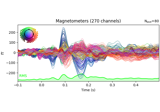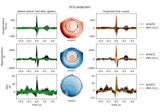mne.preprocessing.compute_proj_eog#
- mne.preprocessing.compute_proj_eog(raw, raw_event=None, tmin=-0.2, tmax=0.2, n_grad=2, n_mag=2, n_eeg=2, l_freq=1.0, h_freq=35.0, average=True, filter_length='10s', n_jobs=None, reject={'eeg': 0.0005, 'eog': inf, 'grad': 2e-10, 'mag': 3e-12}, flat=None, bads=(), avg_ref=False, no_proj=False, event_id=998, eog_l_freq=1, eog_h_freq=10, tstart=0.0, filter_method='fir', iir_params=None, ch_name=None, copy=True, return_drop_log=False, meg='separate', verbose=None)[source]#
Compute SSP (signal-space projection) vectors for EOG artifacts.
This function will:
Filter the EOG data channel.
Find the peaks of eyeblinks in the EOG data using
mne.preprocessing.find_eog_events().Filter the raw data.
Create
Epochsaround the eyeblinks.Optionally average the
Epochsto produce anEvokedifaverage=Truewas passed (default).Calculate SSP projection vectors on that data to capture the artifacts.
Note
Raw data must be preloaded.
- Parameters:
- raw
mne.io.Raw Raw input file.
- raw_event
mne.io.RaworNone Raw file to use for event detection (if None, raw is used).
- tmin
float Time before event in seconds.
- tmax
float Time after event in seconds.
- n_grad
int Number of SSP vectors for gradiometers.
- n_mag
int Number of SSP vectors for magnetometers.
- n_eeg
int Number of SSP vectors for EEG.
- l_freq
float|None Filter low cut-off frequency for the data channels in Hz.
- h_freq
float|None Filter high cut-off frequency for the data channels in Hz.
- averagebool
Compute SSP after averaging. Default is True.
- filter_length
str|int|None Number of taps to use for filtering.
- n_jobs
int|None The number of jobs to run in parallel. If
-1, it is set to the number of CPU cores. Requires thejoblibpackage.None(default) is a marker for ‘unset’ that will be interpreted asn_jobs=1(sequential execution) unless the call is performed under ajoblib.parallel_configcontext manager that sets another value forn_jobs.- reject
dict|None Epoch rejection configuration (see Epochs).
- flat
dict|None Epoch flat configuration (see Epochs).
- bads
list List with (additional) bad channels.
- avg_refbool
Add EEG average reference proj.
- no_projbool
Exclude the SSP projectors currently in the fiff file.
- event_id
int ID to use for events.
- eog_l_freq
float Low pass frequency applied to the E0G channel for event detection.
- eog_h_freq
float High pass frequency applied to the EOG channel for event detection.
- tstart
float Start artifact detection after tstart seconds.
- filter_method
str Method for filtering (‘iir’ or ‘fir’).
- iir_params
dict|None Dictionary of parameters to use for IIR filtering. See mne.filter.construct_iir_filter for details. If iir_params is None and method=”iir”, 4th order Butterworth will be used.
- ch_name
str|None If not None, specify EOG channel name.
- copybool
If False, filtering raw data is done in place. Defaults to True.
- return_drop_logbool
If True, return the drop log.
New in v0.15.
- meg
str Can be ‘separate’ (default) or ‘combined’ to compute projectors for magnetometers and gradiometers separately or jointly. If ‘combined’,
n_mag == n_gradis required and the number of projectors computed for MEG will ben_mag.New in v0.18.
- verbosebool |
str|int|None Control verbosity of the logging output. If
None, use the default verbosity level. See the logging documentation andmne.verbose()for details. Should only be passed as a keyword argument.
- raw
- Returns:
- projs
listofProjection List of computed projection vectors.
- eog_events:
ndarray Detected EOG events.
- drop_log
list The drop log, if requested.
- projs
See also
Notes
Filtering is applied to the EOG channel while finding events using
eog_l_freqandeog_h_freq, and then to therawinstance usingl_freqandh_freqbefore creation of the epochs used to create the projectors.
Examples using mne.preprocessing.compute_proj_eog#

Working with CTF data: the Brainstorm auditory dataset
